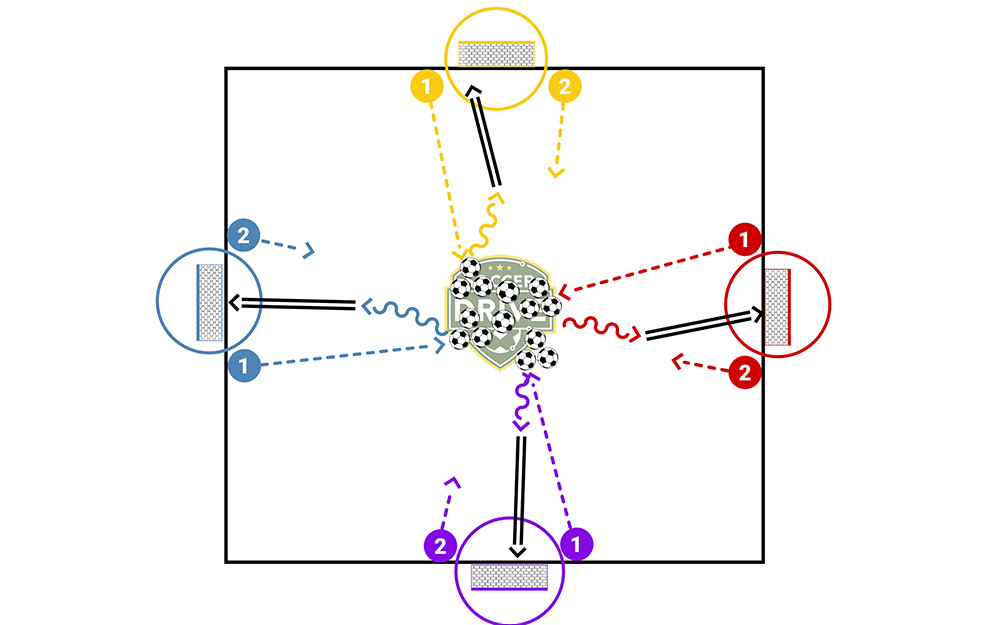
Football is a wonderful way to make friends, but it also teaches you valuable lessons about teamwork. While we all want to be part a larger group, football teaches you that success is only possible if we work together and that our weakest members are the most powerful.
10 life lessons
Football players are taught to push their bodies to the limits. They are continually challenged beyond their comfort levels, and this mindset is transferable to the business world as well as other areas of life. They must never give up on themselves, or they will regret it.

Physical toughness
Football can be a hard sport. Football is a hard sport. It can teach you how you play on the field. But it can also help with mental toughness. You must be mentally tough to excel in football. This is due to the high emotional and visual demands of football. This is why it is so important to take time every day to strengthen your mental fortitude.
Discipline
In sports, discipline is an important skill to master. To achieve your goals, it requires tough decisions and making sacrifices. For instance, you may have to skip a night out and cook dinner at home instead of going to the local bar, and you may have to start training early in the morning. You might also find yourself spending hours in the gym, doing activities you don't love, and so forth. Discipline is an important component of any sport. It can also be beneficial in your professional life.
Leadership
There are many ways in which football teaches leadership. One of the most common ways to teach leadership is through player coaching. Players assume leadership roles throughout the season. These include setting goals, making decisions and organizing team-building activities. This could include something as simple as gathering players for warmups.
Collaboration
It is an important skill in football and can also be useful in other fields. Although you might not need to ask for help every time, it is important that you are open to receiving it. A trusted source can help you with essays, while a classmate could write it for you. As well, you should plan for possible weather delays and injuries that may end your football career.

Being a great teammate
Football and its teams teach children important life lessons. One of these is how to be a great teammate. Being supportive of your team members and understanding your teammates' strengths and weaknesses is key to being a good friend. Being supportive of others is a sign of a good friend.
FAQ
How do you score goals in soccer?
Soccer is all about getting the ball past the defense of your opponent and into their own goal. It is a goal when the ball reaches the goal. In soccer, goals are worth points.
What is a soccer pitch?
A soccer pitch consists of a rectangular grassy area divided by a crossingbar. One half of the field is designated as the attacking zone, where the offensive team tries to score goals. The offensive team tries to score goals in the attacking zone. The defense team defends the offensive from attacks.
How many people do you think play soccer?
Over 200 million people in the world play soccer. In the United States alone, there are about 20 million people who play soccer.
What is a penalty kick in soccer
Penalty kicks can be awarded when a player makes a dangerous or serious mistake. When this occurs, the referee awards the opposing team a penalty kick. This means that the opposing team gets a chance to score a goal if they manage to place the ball inside the goal before time runs out.
How do I play soccer?
A soccer ball is used for playing soccer. A typical match involves 90 minutes of continuous action. The ball is continuously kicked during these 90 minutes. The match ends when the teams with the most goals win.
What does a defender do in soccer
Defenders defend against attackers who are trying to score goals. Defenders defend against attackers trying to score goals by blocking shots and tackling them.
Statistics
- After hosting an entertaining World Cup finals in 1994, the United States possessed some 16 million football players nationwide, up to 40 percent of whom were female. (britannica.com)
- the estimated cumulative television audience for the 2006 World Cup in Germany was 26.2 billion, an average of 409 million viewers per match. (en.wikipedia.org)
- The Laws of the Game do not specify any player positions other than goalkeeper, [74] These positions are further subdivided according to the area of the field in which the player spends the most time. (en.wikipedia.org)
- the estimated cumulative television audience for the 2006 World Cup in Germany was 26.2 billion, an average of 409 million viewers per match." (en.wikipedia.org)
- Get 10% off your first purchase using code BLOG. (technefutbol.com)
External Links
How To
How to play soccer
Playing Soccer requires you to have good skills such as dribbling, passing, shooting, heading, tackling, etc. These skills must be improved. It is important to practice these skills every day. Follow these steps to learn how you can play soccer well.
-
Practice dribbling. You can practice dribbling on the field until it becomes natural. Practice dribbling by doing it in five minute increments. Once you feel comfortable with dribbling, increase the duration to 10 minutes. This technique should be practiced daily.
-
Practice passing. Practice passing the ball to both sides. It is important to correctly pass the ball to the person in the available space. Do not throw long passes. It is better to throw the ball directly at the player who needs it. This will save you time and keep your body warm.
-
Practice heading. To head, you must place the ball exactly into the net. To achieve this aim, you must first practice getting yourself into position. Face the target and stand next to the goal line. Next, bend forward and place the ball under you chin. Next, raise your head up and look towards the top left corner of the net. Look straight ahead with your eyes. Stand up straight and let the ball go.
-
Practice tackling. Tackling is one of the hardest techniques to master. This skill can make football more exciting when it is mastered. To begin, you should tackle with your chest and shoulders. Do not go too low. Also, remember to keep your arms close to your body. It is better to tackle in smaller groups of two people. One player serves as the defender, while the other acts as an attacker. The attacker must be tackled as soon the attacker passes the defender.
-
Shooting is a skill that can be learned. Shooting is a skill that is difficult to master and requires a lot practice. Begin by finding a spot you are able to comfortably shoot from. You should be near the goal. Focus on your form. You can hold the ball between your fingers, but keep it away from your body. Your knees should be bent and your feet should point upwards. Make a circular motion with your wrist to shoot the ball. You want to hit the bottom right corner.
-
Practice running. Running is another skill you need to learn. Start off slowly and gradually build up speed. Running should not be used to attack as it will cause muscle fatigue. Instead, run towards the goal to assist your teammates.
-
Practice kicking. Kicking is one of the easiest skills to learn but also one of the toughest. You need to strengthen your core, legs and core to kick correctly. You can place your feet together and lift one foot at a stretch. Slowly kick it towards the net using your heels.
-
Keep practicing dribbling. This skill is vital to your success as a player. Dribbling allows you to control the pace of the game. Dribbling is crucial to controlling the pace and preventing your opponents from catching up or overtaking you. The key to mastering dribbling is consistency. It is important to not change the way you dribble each day. Stick to what works for you.
-
Free kicks are available for practice. Free kicks are usually delivered after a foul or when the goalkeeper commits a mistake. You can score goals with free kicks without needing to play the whole match. It is a good idea to aim for the corner of the goal. Remember to always use your instep and not your heel.
-
Practice defending. Defending is all about positioning. Always keep in close proximity to your opponent's player while playing defense. Block his path so that he doesn't score. Always keep your safety in mind.